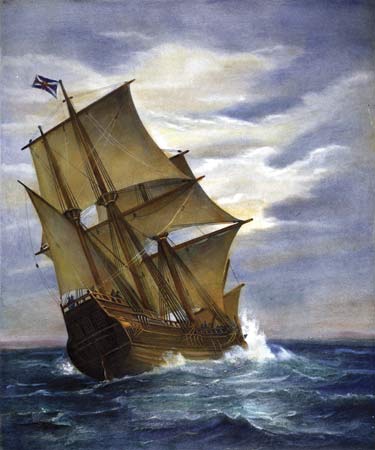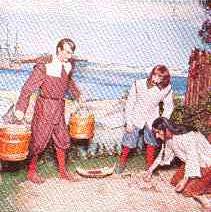
Online Texts for Craig White's Literature Courses
|
from Chapter Twelve. [The Mayflower returns; Indian relations; the first Thanksgiving] |
|
Instructor's Summary of Chapter 12: With many sick and little shelter, the Pilgrims keep the Mayflower from returning to England so they can use it for supply and refuge.
![]() Squanto, the
Pilgrims' Indian guide, teaches them to cultivate Indian crops using fish as fertilizer.
Squanto, the
Pilgrims' Indian guide, teaches them to cultivate Indian crops using fish as fertilizer.
![]() Bradford refers
to the epidemic
that decimated Indian populations before the Pilgrims
arrived, but that one warlike tribe, the Narragansett, were not affected
by the epidemics and remain strong.
Bradford refers
to the epidemic
that decimated Indian populations before the Pilgrims
arrived, but that one warlike tribe, the Narragansett, were not affected
by the epidemics and remain strong.
![]() At harvest time, the Pilgrim community invites the Indians of Massasoit for feasting
and games, marking what later Americans
call "the First Thanksgiving."
At harvest time, the Pilgrim community invites the Indians of Massasoit for feasting
and games, marking what later Americans
call "the First Thanksgiving."
![]() An event
on
Christmas Day shows divisions in the community: the Pilgrims regard
traditional English celebrations of Christmas as pagan, so that
Christmas day is just another working day, but evidently the
non-Pilgrims in their
community were less committed to the
Protestant
(Puritan) Work Ethic. This episode confirms the Puritan reputation
as "no partying" and policing other people's private behavior.
An event
on
Christmas Day shows divisions in the community: the Pilgrims regard
traditional English celebrations of Christmas as pagan, so that
Christmas day is just another working day, but evidently the
non-Pilgrims in their
community were less committed to the
Protestant
(Puritan) Work Ethic. This episode confirms the Puritan reputation
as "no partying" and policing other people's private behavior.
(H.L. Mencken's definition of Puritanism: "
![]()
Anno 1621
[¶12.1] They now began to dispatch the ship away which brought them over, which lay till about this time, or the beginning of April. The reason on their parts why she [the Mayflower] stayed so long, was the necessity and danger that lay upon them, for it was well towards the end of December before she could land anything here, or they able to receive anything ashore. Afterwards, the 14th of January the house which they had made for a general rendezvous by casualty fell afire, and some were fain [forced] to retire aboard [the ship] for shelter. Then the sickness began to fall sore [severely] among them, and the weather so bad as they could not make much sooner any dispatch. Again, the Governor [Bradford] and chief of them, seeing so many die, and fall down sick daily, thought it no wisdom to send away the ship, their condition considered, and the danger they stood in from the Indians, till they could procure some shelter; and therefore thought it better to draw some more charge upon themselves and friends, than hazard all. The master and sea-men likewise, though before they hasted [hurried] the passengers ashore to be gone, now many of their men being dead, and of the ablest of them, (as is before noted,) and of the rest many lay sick and weak, the master durst not put to sea, till he saw his men begin to recover, and the heart of winter over.
|
[¶12.2] Afterwards they [the Pilgrims] (as many as were able) began to plant their corn, in which service Squanto stood them in great stead, showing them both the manner how to set it, and after how to dress and tend it. Also he told them except they got fish and set with it (in these old grounds) it would come to nothing, and he showed them that in the middle of April they should have store enough come up the brook, by which they began to build, and taught them how to take it, and where to get other provisions necessary for them; all which they found true by trial and experience. Some English seed they sewed, as wheat and peas, but it came not to good, either by the badness of the seed, or lateness of the season, or both, or some other defect. . . |
|
[¶12.3] Having in some sort ordered their business at home, it was thought meet to send some abroad to see their new friend Massasoit, and to bestow upon him some gratuity [gift] to bind him the faster [more tightly] unto them; as also that hereby they might view the country, and see in what manner he lived, what strength he had about him, and how the ways were to his place, if at any time they should have occasion.
[¶12.4] So the second of July they sent Mr. Edward Winslow and Mr. Hopkins, with the foresaid Squanto for their guide, who gave him [Massasoit] a suit of clothes, and a horseman’s coat, with some other small things, which were kindly accepted; but they found but short commons [inadequate food], and came both weary and hungry home. For the Indians used then to have nothing so much corn as they have since the English have stored them with their hoes, and seen their industry in breaking up new grounds therewith. [Contrast the subsistence economics of traditional, tribal peoples ("short commons") with the intensive growth-productivity of modern economics and technology the English practice with Squanto's help.]
[¶12.5] They found his [Massasoit’s] place to be 40 miles from hence, the soil good, and the people not many, being dead and abundantly wasted in the late great mortality which fell in all three parts about three years before the coming of the English, wherin thousands of them died, they not being able to bury one another; their skulls and bones were found in many places lying still above ground, where their houses and dwellings had been; a very sad spectacle to behold. [References to "virgin-soil epidemic" of European diseases that decimated coastal Indian tribes 1613=1619]
[¶12.6] But they brought word that the Narragansett lived but on the other side of that great bay, and were a strong people, and many in number, living compact together, and had not been at all touched with this wasting plague.
[¶12.7] About the latter end of this month, one John Billington [a young Pilgrim] lost himself in the woods, and wandered up and down some five days, living on berries and what he could find. At length he light on [came upon] an Indian plantation, 20 miles south of this place, called Manamet, they conveyed him further off, to Nawsett, among those people that had before set upon the English when they were coasting, whilst the ship lay at the Cape, as is before noted. But the Governor caused him to be enquired for among the Indians, and at length Massassoit sent word where he was, and the Governor sent a shallop [small boat] for him, and had him delivered. Those people also came and made their place; and they gave full satisfaction to those whose corn they had found and taken when they were at Cape Cod. [The Pilgrims restore the Indian corn they took from an abandoned settlement when they explored Cape Cod in chapter 10, paragraph 5.]
[¶12.8] Thus their peace and acquaintance was pretty well established with the natives about them; and there was another Indian called Hobamack come to live amongst them, a proper lusty man, and a man of account for his valor and parts amongst the Indians, and continued very faithful and constant to the English till he died. He and Squanto being gone upon business among the Indians, at their return (whether it was out of envy to them or malice to the English) there was a Sachem called Corbitant, allied to Massassoit, but never any good friend to the English to this day, met with them at an Indian town called Namassakett 14 miles to the west of this place, and began to quarrel with them, and offered to stab Hobamack; but being a lusty man, he [Hobamack] cleared himself of him, and came running away all sweating and told the Governor [Bradford] what had befallen him, and he [Hobamack] feared they had killed Squanto, for they threatened them both, and for no other cause but because they were friends to the English, and serviceable unto them.
[¶12.9] Upon this the Governor [Bradford] taking counsel, it was conceived not fit to be borne; for if they should suffer their friends and messengers thus to be wronged, they should have none would cleave unto them, or give them any intelligence, or do them service afterwards; but next they would fall upon themselves. Whereupon it was resolved to send the Captain and 14 men well armed, and to go and fall upon them in the night; and if they found that Squanto was killed, to cut off Corbitant’s head, but not to hurt any but those that had a hand in it. Hobamack was asked if he would go and be their guide, and bring them there before day. He said he would, and bring them to the house where the man lay, and show them which was he. So they set forth the 14th of August, and beset the house round; the Captain giving charge to let none pass out, entered the house to search for him. But he was gone away that day, so they missed him; but understood that Squanto was alive, and that he had only threatened to kill him, and made an offer to stab him but did not.
[¶12.10] So they withheld and did no more hurt, and the people [Indians] came trembling, and brought them the best provisions they had, after they were acquainted by Hobamack what was only intended. There was three sore wounded which broke out of the house, and assayed [attempted] to pass through the guard. These they brought home with them, and they had their wounds drest and cured, and sent home. After this they had many gratulations from diverse sachems, and much firmer peace; yea, those of the Isles of Capawack sent to make friendship; and this Corbitant himself used the mediation of Massassoit to make his peace, but was shy to come near them a long while after.
[¶12.11] After this, the 18th of September: they sent out their shallop [boat] to the Massachusetts [the tribe after whom the area was named, much reduced [by the epidemic], with ten men, and Squanto for their guide and interpreter, to discover and view that bay, and trade with the natives, the which they performed, and found kind entertainment. The [Massachusett] people were much afraid of the Tarentines, a people to the eastward [toward Maine] which used to come in harvest time and take away their corn, and many times kill their persons. They [Pilgrims] returned in safety, and brought home a good quantity of beaver [pelts], and made report of the place, wishing they had been there seated [a decade later the “Great Migration” of Puritans to Boston would colonize Massachusetts Bay]; (but it seems the Lord, who assigns to all men the bounds of their habitations, had appointed it for an other use). And thus they found the Lord to be with them in all their ways, and to bless their outgoings and incomings, for which let his holy name have the praise for ever, to all posterity.
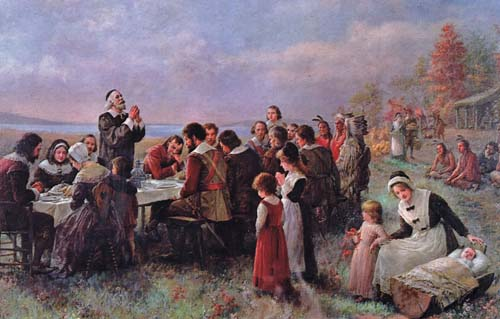 |
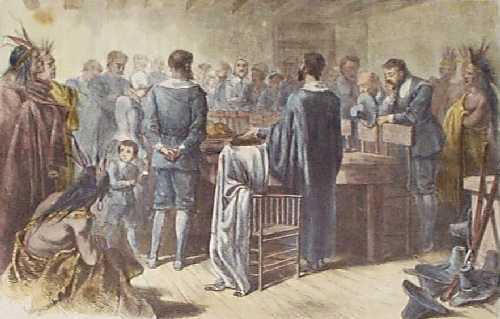 |
Popular art depicting the First Thanksgiving
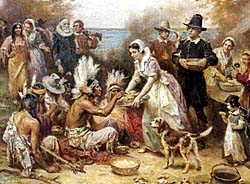
[Instructor’s note: Bradford's is one of two accounts of the First Thanksgiving--see the second immediately below Bradford's.]
[¶12.12] They [the Pilgrims] began now to gather in the small harvest they had, and to fit up their houses and dwellings against winter, being all well recovered in health and strength, and had all things in good plenty; for as some were thus employed in affairs abroad, others were exercised in fishing, about cod, and bass, and other fish, of which they took good store, of which every family had their portion. All the summer there was no want. And now began to come in store of fowl, as winter approached, of which this place did abound when they came first (but afterward decreased by degrees). [Here is the other side of modern growth-economics, whose high levels of consumption exhaust nature’s resources, requiring further immigration to satisfy the needs of growing populations.] And besides water fowl, there was great store of wild Turkeys, of which they took many, besides venison, etc. Besides they had about a peck a meal a week to a person, or now since harvest, Indian corn to that proportion. Which made many afterwards write so largely of their plenty here to their friends in England, which were not feigned [pretended], but true reports. . . .
![]()
from A
Journal of the Pilgrims at Plymouth (Mourt's Relation) E
(Mourt's Relation is a collection of anonymous writings by Pilgrims and Puritans concerning the early days--i. e., the 1620s & 30s--of their settlements in New England.)
(from Edward Winslow's letter of 11 Dec. 1621 to a friend in England)
82 Our harvest being gotten in, our governor sent four men on fowling, that so we might after a special manner rejoice together after we had gathered the fruit of our labors. They four in one day killed as much fowl as, with a little help beside, served the company almost a week. At which time, amongst other recreations, we exercised our arms [firearms?], many of the Indians coming amongst us, and among the rest their greatest king Massasoit, with some ninety men, whom for three days we entertained and feasted, and they went out and killed five deer, which they brought to the plantation and bestowed on our governor, and upon the captain and others. And although is be not always so plentiful as it was at this time with us, yet by the goodness of God, we are so far from want that we often wish you [English reader(s)] partakers of our plenty.
![]()
[¶12.13] Soon after this ship’s departure, the great people of the Narragansett [Indians], in a braving [warlike] manner, sent a messenger unto them [the Pilgrims] with a bundle of arrows tied about with a great snakeskin; which their interpreters told them was a threatening and a challenge. Upon which the Governor, with the advice of others sent them a round answer, that if they had rather have war than peace, they might begin when they would; they had done them no wrong, neither did they fear them, or should they find them unprovided. And by another messenger sent the snakeskin back with bullets in it; but they would not receive it, but sent it back again. But these things I do but mention, because they are more at large already put forth in print by Mr. Winslow [in Good News from New England, 1624], at the request of some friends. And it is likely the reason was their own ambition, who, (since the death of so many of the Indians,) thought to domineer and lord it over the rest, and conceived the English would be a bar in their way, and saw that Massasoit took shelter already under their wings.
[¶12.14] But this made them [the English Pilgrims] the more carefully to look to themselves, so as they agreed to enclose their dwellings with a good strong pale [fence], and make flankers [fortifications] in convenient places, with gates to shut, which were every night locked, and a watch kept and when need required there was also warding [guarding] in the day time. And the company was by the Captain and the Governor advice, divided into four squadrons, and every one had their quarter appointed them, unto which they were to repair upon any sudden alarm. And if there should be any cry of fire, a company were appointed for a guard, with muskets, whilst others quenched the same, to prevent Indian treachery. This was accomplished very cheerfully, and the town impaled [fenced] round by the beginning of March, in which every family had a pretty garden plot secured. And herewith I shall end this year.
[The Pilgrims and other Puritans, associating “gaming and reveling” on Christmas day with the old English Church, regarded December 25th as just another work day.]
[¶12.15] Only I shall remember one passage more, rather of mirth then of weight. On the day called Christmas day, the Governor [Bradford] called them out to work, (as was usual,) but the most of this new company excused themselves and said it went against their consciences to work on that day. So the Governor told them that if they made it matter of conscience, he would spare them till they were better informed.
[¶12.16] So he led away the rest and left them; but when they [the workers] came home at noon from their work, he [Governor Bradford] found them [the workers who pled conscience against working on Christmas Day] in the street at play, openly; some pitching the bar and some at stool-ball*, and such like sports. So he went to them, and took away their implements, and told them that was against his conscience, that they should play and others work. If they made the keeping of it matter of devotion, let them keep their houses, but there should be no gaming or reveling in the streets. Since which time nothing hath been attempted that way, at least openly. [*stoolball = ancient European game, predecessor of cricket and baseball, still played in some parts of England]
End Chapter 12



